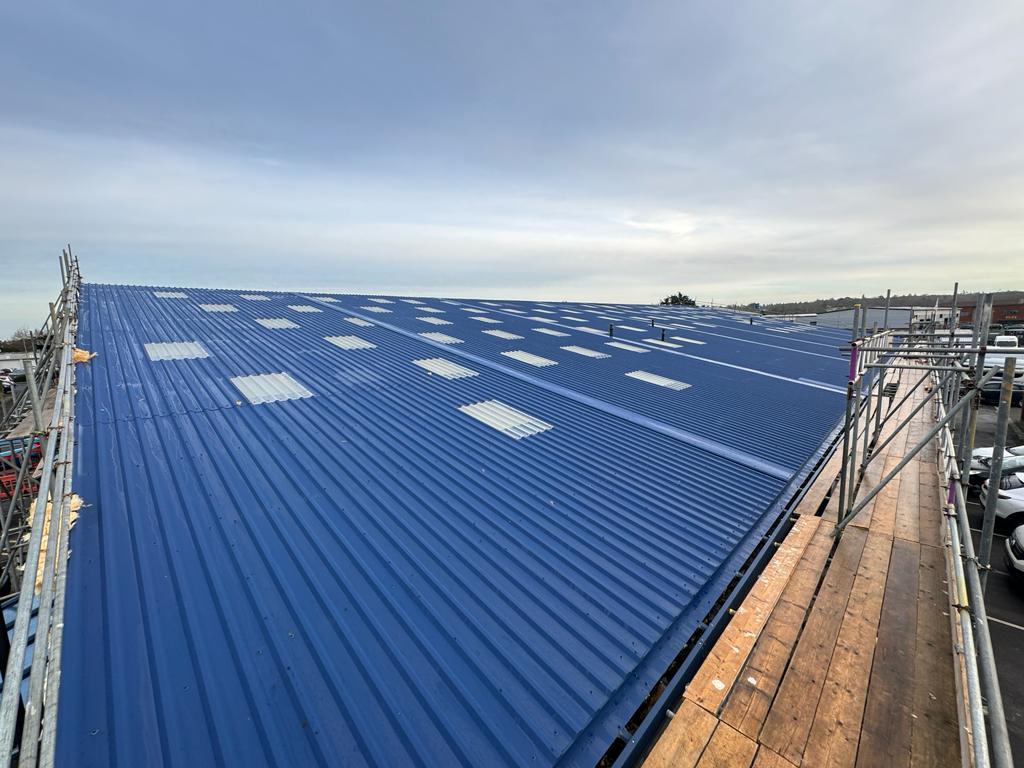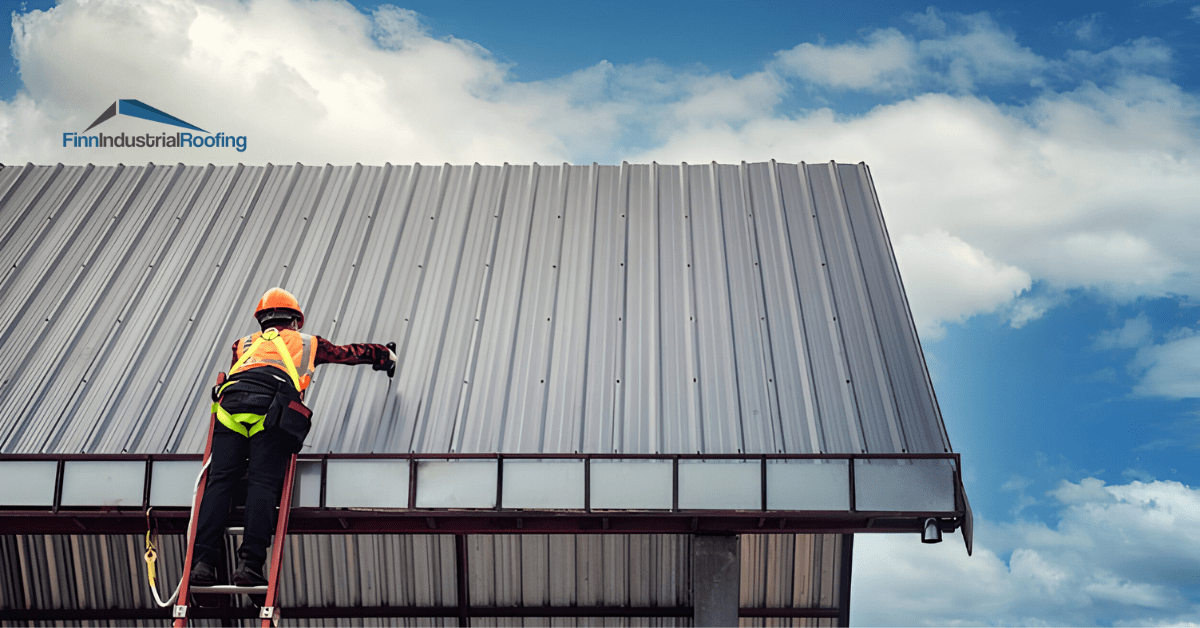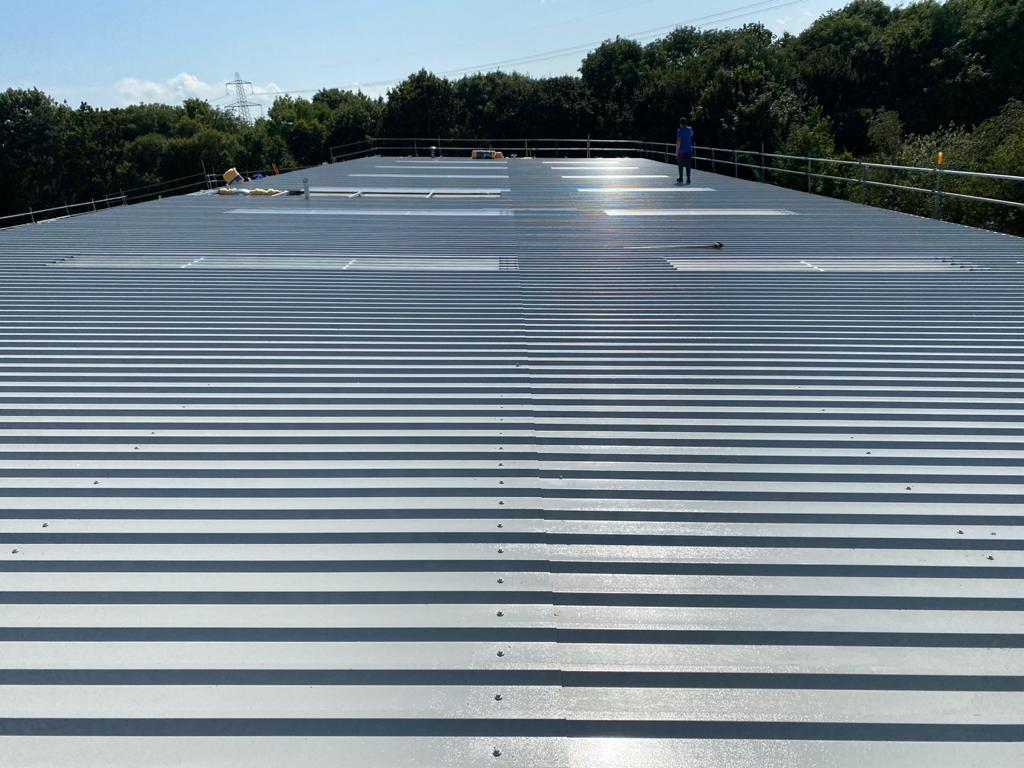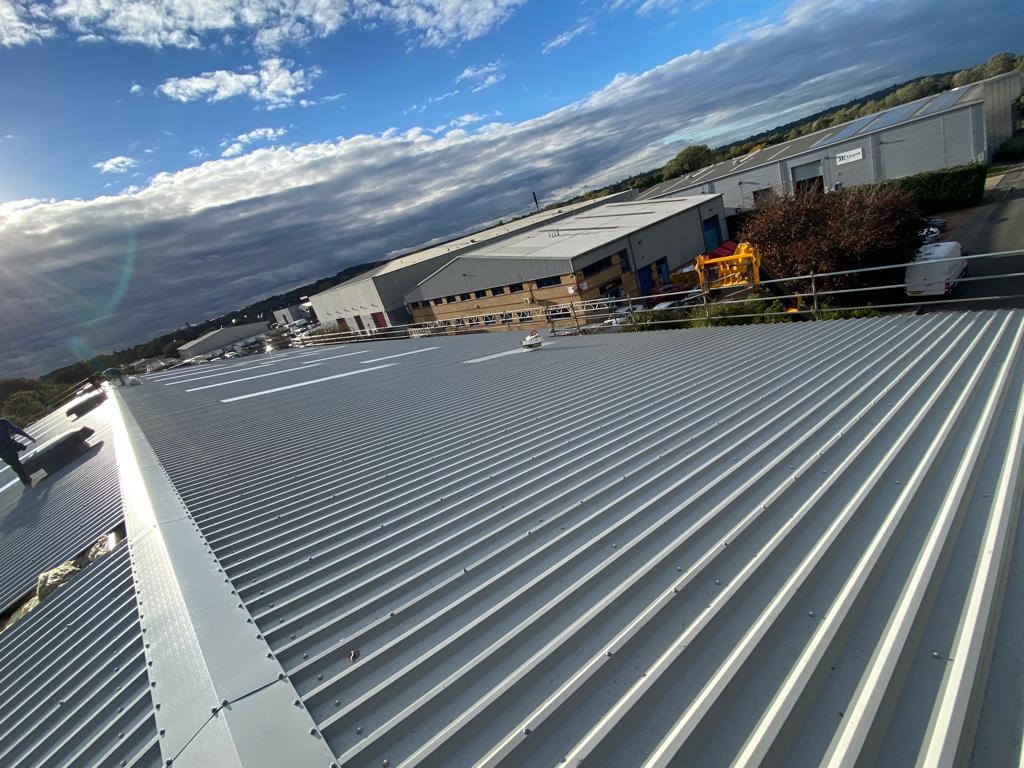Metal roofing sheets, while more expensive at the point of purchase, provide long-term value through durability and minimal upkeep. Plastic and asphalt roofing may be cheaper upfront, but often involve higher maintenance or replacement costs over time.
To ensure the maximum lifespan of your roofing solution, we offer regular inspections and maintenance – to ensure your industrial roof is kept in the best condition possible.
Industrial business owners in Dorset should check for wear, damage or leaks early. Immediate repairs can help avoid larger problems later and maintain the roof’s performance for decades.
Why Use Metal Roofing Sheets?
In comparison to individual tiles or slates, metal sheet roofing offers broader coverage and dependable protection. Whether for barns, industrial buildings or other buildings large and small, roofing sheets are a long-lasting, flexible solution, that are suitable for a wide range of applications.
Types of Roofing Sheets
Metal roofing sheets are widely chosen across Dorset for their strength and resilience. They handle tough weather conditions well and can last many years when properly maintained. Their light weight eases installation and reduces pressure on supporting structures. They also come in a variety of colours and profiles, helping them match various property designs. However, metal roofs can be noisy during heavy rainfall, which may be a drawback for some.

Made from galvanised steel coils in either 0.5mm or 0.7mm thickness, metal sheets are robust and weatherproof. They are produced in several styles, including Box Profile, Corrugated, Standing Seam, and Tile Effect, the latter of which imitates traditional tiles. Options are available with extra coatings for protection against corrosion.
These sheets suit agricultural, commercial, and domestic settings, providing a traditional look where needed.
Benefits:
- Available in custom lengths to meet project needs
- Require minimal upkeep
- High-quality finish
- Lightweight and simple to install
- Long-lasting when coated for protection
- Suitable for wall cladding on buildings
- Choice of coatings: PVC, Polyester, GreenCoat® Pural BT
Drawbacks:
- Susceptible to dents depending on material
- Can be loud during rainfall if not soundproofed
- Older PVC sheets may be hard to repair
- Unsuitable for flat roof setups
Lifespan
Sheets with a PVC finish, for instance, can last up to 40 years and show less visible ageing when maintained properly.
Installation Notes
Due to their size, weight, and number of fixings required, metal sheets can take time to install. Gloves must be worn during handling, as sheet edges are sharp.
Typical Costs
Prices vary based on sheet type and thickness. For 0.5mm thick galvanised steel or polyester-coated sheets, expect to pay around £14 per metre. PVC-coated sheets are about £15 per metre, while GreenCoat® Mica BT coated Tile Form sheets can reach £18 per metre. Prices include VAT and can increase with thickness.
When choosing metal sheets, consider both building regulations and visual impact. Some Dorset properties, especially older or traditionally styled ones, may require materials that match their appearance and comply with rules on insulation or fire resistance.
Asphalt Roofing Sheets
Asphalt sheets, commonly installed as shingles, are another option in Dorset. They offer good protection from the weather and are cost-effective. With many styles and colours available, they allow design flexibility. Installation and repairs are also straightforward. However, their service life is usually shorter than metal or plastic—generally lasting 20–30 years.
Examples of Metal Roofing Applications
- Olive Green PVC 34/1000 Metal Sheets from Cladco have been fitted on a large barn, with the coating offering extra durability.
- Tile Form sheets have been used to replicate a tiled roof appearance on a large barn.
- Black Corrugated Cladco Sheets have been used as cladding for an outdoor sauna.
Plastic Roofing Sheets
Plastic sheets are ideal for small structures like sheds or lean-tos. Corrugated plastic is the most common type. When selecting this material, it’s essential to assess whether the roof will bear weight, as strength varies depending on the type of plastic used.
If there’s no risk of heavy load, lightweight plastic sheeting is cost-effective for minor builds.
Benefits:
- Available in clear or opaque versions
- Simple to clean
- Very light
- Budget-friendly
- Easy to handle and install
Drawbacks:
- Less attractive in appearance
- Not suited to homes
- Can generate noise
Lifespan
Plastic sheets, when well maintained, can last up to 40 years. Lifespan depends on routine cleaning and general upkeep.
Installation Notes
They are easy to fit using basic tools. Gloves, a saw, and a screwdriver are typically enough. Install at a pitch of at least 10 degrees, and overlap by two corrugations minimum.
Typical Costs
Plastic sheets cost around £12 per metre, making them the cheapest among roofing materials. Installation requires few tools and supplies.
Lightweight corrugated plastic is a good fit for lean-tos, walkways, or small projects.
Polycarbonate Roofing Sheets
Polycarbonate is a tough yet light alternative to glass. It’s often used for carports, conservatories, wood stores, or animal shelters—places that need durability and warmth. Made from impact-resistant polypropylene resin, these sheets are easy to handle and cut.
Benefits:
- Provides UV protection
- Performs well in all weather
- Offers thermal insulation
- Chemically neutral, resisting water and oils
- Wide colour selection
- Lightweight and easy to install
- Highly durable
Drawbacks:
- Prone to scratching
Lifespan
Generally, polycarbonate lasts up to 20 years. In light-use settings like conservatories, if you notice a drop in warmth, it might indicate the need for early replacement.
Installation Notes
Thanks to their low weight, these sheets are easy to transport and install. A minimum pitch of 5 degrees is required for water runoff.
Typical Costs
Total installed cost for polycarbonate roofs ranges from £205 to £300. Labour tends to be lower due to ease of fitting.
Polycarbonate offers a strong, practical substitute for glass roofing.
Bitumen Roofing Sheets
Bitumen is an economical roofing material, well-suited to garages, sheds, or log stores. It is waterproof and easy to install compared with heavier options. It can also be laid as flat roofing when used as bitumen felt.
Benefits:
- Very little maintenance required
- Strong under tension
- Retains heat well
- Long-lasting
- Works on flat roofs
- Several colour choices
Drawbacks:
- May suffer small tears or cracks over time
- Lower impact resistance
Lifespan
Properly installed and maintained bitumen roofs can last over 20 years. Small tears signal that the roof may need replacement.
Installation Notes
Bitumen sheets must be fitted by trained professionals. The joining method involves applying heat to weld the sheets, which poses risks if done by non-professionals.
Typical Costs
Bitumen is among the most affordable roofing types, particularly for small builds, offering the lowest cost per metre.
Professional installation is necessary for melt-and-weld applications like flat roofs.
Fibre Cement Roofing Sheets
Suitable for both rural and residential properties, fibre cement sheets have one of the longest lifespans of all roofing materials. They are strong, available in various colours, and are considered a more sustainable option compared to plastic or bitumen.
Benefits:
- Highly durable
- Good airflow and breathability
- Environmentally friendly
- Resists moisture
- Blends well with rural settings
- Available as shingles or sheets to mimic tiles or slates
Drawbacks:
- Heavier than most other options
- Moderate impact resistance
- Higher cost
- Slower to install
Lifespan
Few materials surpass the longevity of fibre cement roofing—only slate can last longer. These sheets offer decades of use and are ideal if long life is a key requirement.
Installation Notes
Fitting fibre cement takes longer due to its weight. However, once in place, installation is typically straightforward and requires fewer follow-up tasks.













